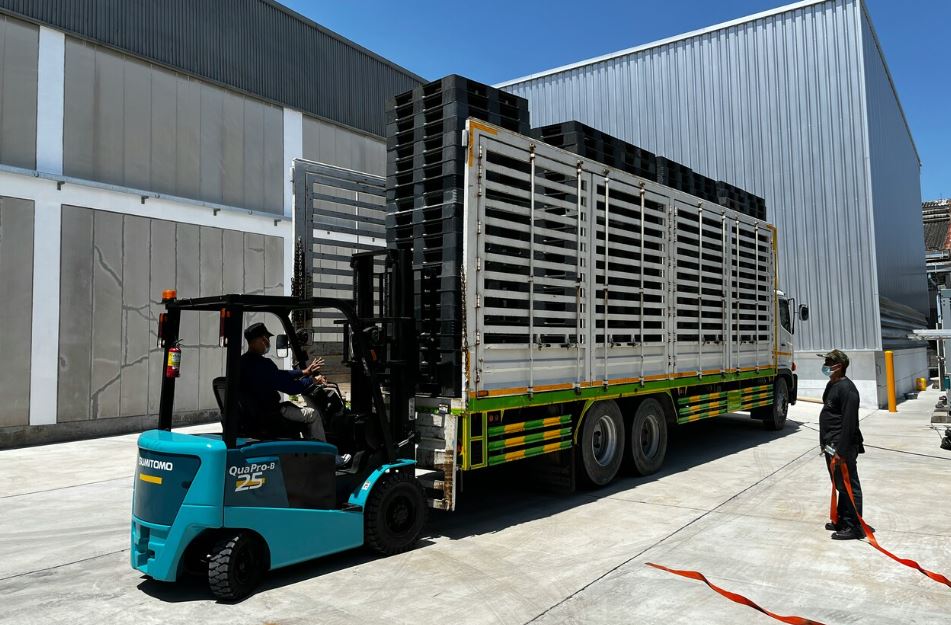Plastic is often associated with things that are harmful to the environment, due to it not being biodegradable. However, in certain scenarios and industries, plastic can actually be a more sustainable and cost-effective solution than some natural materials. Plastic pallets are one of such examples, used in retail, warehouse management, and transportation. Here are their key advantages compared to wooden pallets.
Total cost of ownership
Wooden pallets are up to three times less expensive than plastic pallets, if we look at the up fort costs. However, they are also much more durable than wooden pallets, with the ability to last 10 to 15 years. They are incredibly resilient to various damages or harsh weather conditions, meaning they are less likely to break, rot, or be ruined by chemical damage. Plastic pallets can be reused lots of times before they have to be replaces, minimising replacement costs too. This means that the higher initial investment often leads to substantial long-term savings and, overall, lower total cost of ownership.
Sustainability
Although not biodegradable, plastic pallets are recyclable, meaning they do not have to contribute to environmental waste. In fact, they support the principles of circular economy, thanks to their long lifespan and durability. Their production is relatively resource-efficient, often made from recycled materials via injection moulding, which also makes them more sustainable. Not just that, the space optimisation that businesses achieve with plastic pallets can also reduce their CO2 emissions long-term.
Hygiene
One of the biggest disadvantages of wooden pallets is their tendency to absorb bacteria, odours, moisture, and chemicals. Plastic pallets, on the other hands, are designed to maintain the highest hygiene standards. Their completely smooth surfaces make them easy to clean and, therefore, get rid of any bacteria effectively. Additionally, they are temperature resistant, which means they can be used in freezer zones too. This makes them useful in food or pharma industries, which have particularly strict hygiene and safety regulations.
Practical benefits
Plastic pallets are usually lighter in weight than wooden ones, which does not only make them easier to handle, but also can reduce fuel consumption during transportation. Additionally, plastic pallets are highly stackable and space-efficient, allowing businesses to transport more in one journey. Unlike wood, plastic also does not have any splinters or nails, so they are safer to handle manually too. But, even with all of these practical aspects, plastic pallets still boast an impressive load capacity to pallet weight ratio.
Automation compatibility
With a lot of industries now utilising smart technology for their operations, having automation-comparable pallets is an important consideration. Plastic pallets are highly uniform, meaning they come in consistent dimensions and specifications. This makes them ideal for uses with machinery, such as robotic handling, or automated storage systems. They can also be personalised with different markings or colours, so the machines can easily recognise the right items.
Final word
As surprising as it might sound, plastic pallets are the safer, more durable, and more environmentally sound solution, especially compared to wooden pallets. While they do require a higher initial investment, it is the forward-thinking choice for businesses in various industries.
This article does not necessarily reflect the opinions of the editors or management of EconoTimes.



 OpenAI Expands Enterprise AI Strategy With Major Hiring Push Ahead of New Business Offering
OpenAI Expands Enterprise AI Strategy With Major Hiring Push Ahead of New Business Offering  Trump Backs Nexstar–Tegna Merger Amid Shifting U.S. Media Landscape
Trump Backs Nexstar–Tegna Merger Amid Shifting U.S. Media Landscape  Rio Tinto Shares Hit Record High After Ending Glencore Merger Talks
Rio Tinto Shares Hit Record High After Ending Glencore Merger Talks  Ford and Geely Explore Strategic Manufacturing Partnership in Europe
Ford and Geely Explore Strategic Manufacturing Partnership in Europe  Once Upon a Farm Raises Nearly $198 Million in IPO, Valued at Over $724 Million
Once Upon a Farm Raises Nearly $198 Million in IPO, Valued at Over $724 Million  Hims & Hers Halts Compounded Semaglutide Pill After FDA Warning
Hims & Hers Halts Compounded Semaglutide Pill After FDA Warning  Sony Q3 Profit Jumps on Gaming and Image Sensors, Full-Year Outlook Raised
Sony Q3 Profit Jumps on Gaming and Image Sensors, Full-Year Outlook Raised  American Airlines CEO to Meet Pilots Union Amid Storm Response and Financial Concerns
American Airlines CEO to Meet Pilots Union Amid Storm Response and Financial Concerns  Uber Ordered to Pay $8.5 Million in Bellwether Sexual Assault Lawsuit
Uber Ordered to Pay $8.5 Million in Bellwether Sexual Assault Lawsuit  Nvidia CEO Jensen Huang Says AI Investment Boom Is Just Beginning as NVDA Shares Surge
Nvidia CEO Jensen Huang Says AI Investment Boom Is Just Beginning as NVDA Shares Surge  Alphabet’s Massive AI Spending Surge Signals Confidence in Google’s Growth Engine
Alphabet’s Massive AI Spending Surge Signals Confidence in Google’s Growth Engine  Missouri Judge Dismisses Lawsuit Challenging Starbucks’ Diversity and Inclusion Policies
Missouri Judge Dismisses Lawsuit Challenging Starbucks’ Diversity and Inclusion Policies  Nasdaq Proposes Fast-Track Rule to Accelerate Index Inclusion for Major New Listings
Nasdaq Proposes Fast-Track Rule to Accelerate Index Inclusion for Major New Listings  Baidu Approves $5 Billion Share Buyback and Plans First-Ever Dividend in 2026
Baidu Approves $5 Billion Share Buyback and Plans First-Ever Dividend in 2026  Washington Post Publisher Will Lewis Steps Down After Layoffs
Washington Post Publisher Will Lewis Steps Down After Layoffs  Nvidia, ByteDance, and the U.S.-China AI Chip Standoff Over H200 Exports
Nvidia, ByteDance, and the U.S.-China AI Chip Standoff Over H200 Exports  Global PC Makers Eye Chinese Memory Chip Suppliers Amid Ongoing Supply Crunch
Global PC Makers Eye Chinese Memory Chip Suppliers Amid Ongoing Supply Crunch 































